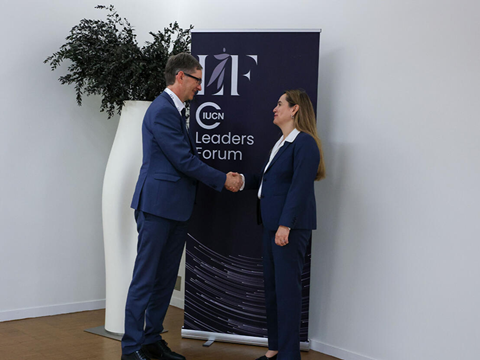
The End Plastic Pollution International Collaborative (EPPIC), a public-private partnership intending to bolster international efforts to tackle the impacts of plastic pollution, will receive $14 million in funding from the United States government.
The development was announced in Geneva, Switzerland, during the third edition of the International Union for Conservation of Nature’s (IUCN) Leaders Forum. Alongside The Aspen Institute, The Ocean Foundation, and Searious Business, IUCN hosts and implements the EPPIC partnership.
EPPIC seeks to bring governments, businesses, civil society, and philanthropic groups together to drive cooperation between diverse stakeholders. Its goal is to support worldwide projects working to combat plastic pollution, starting with those that redesign and reimagine the use of plastic products.
“Plastic pollution is a global crisis that transcends boundaries and affects us all,” said IUCN director general Dr Grethel Aguilar. “Governments, the private sector, civil society, academia, communities must work together if we are to protect nature, biodiversity and human health.
“We must support new approaches to reduce, reuse and recycle plastics. This funding and continuing commitment from the U.S. State Department, announced here at the IUCN Leaders Forum, will ensure the continuing, successful implementation of the EPICC partnership as it seeks to expand its reach.”
Dr John Thompson, the U.S. Deputy Assistant Secretary of State for Environment in the Department of State’s Bureau of Oceans and International Environmental and Scientific Affairs, announced the pledge. It comes in addition to previous government funding, raising the U.S. Department of State’s total investment in the project to $28 million.
Reportedly, the U.S. intends to drive multi-stakeholder cooperation, with the latest investment described as a ‘vital step’ to help scale EPPIC’s operations.
“This significant contribution underscores the United States’ commitment to supporting sustainable solutions and addressing the global challenge of plastic pollution,” Dr Thompson elaborated. “It reinforces our dedication to tackling plastic pollution and strengthens our collaboration with our hosts, IUCN, The Ocean Foundation, the Aspen Institute, and Searious Business.”
With the new funding, EPPIC intends to expand its impact into the reduction, reuse, and recycling of plastic waste – helping to raise public awareness; support policy developments to streamline the path into a circular economy; and encourage multi-stakeholder business development, especially among SMEs operating in the upstream and downstream stages of the plastic life cycle.
National efforts to reduce plastic pollution, as well as the implementation of a ‘comprehensive and inclusive’ international agreement, are set to be supported. While EPICC currently operates in Costa Rica, Guatemala, and Senegal, further initiatives are planned to take place in Ghana, Kenya, South Africa, and various Small Island Developing States (SIDS) across the African continent.
Going forward, the partnerships hopes to join forces with similar initiatives in other regions, forming strategic partnerships beyond Latin America and Sub-Saharan Africa.
Applications are currently open for EPPIC’s Grant Program, in which African projects staging national interventions in the generation of upstream and midstream plastic pollution will receive funding. EPPIC hopes that this programme will cut down on waste, reduce demand, and maximize circularity.
Furthermore, the partnership will soon launch its EPPIC Innovation Prize. In doing so, it aims to spur the creation of ‘cutting-edge’ solutions to ongoing roadblocks and drive both innovation and circularity for plastics.
EPPIC is also set to act as an ‘important complement’ to the incoming Global Plastics Treaty. With INC-5 taking place in November, the partnership seeks to go beyond national efforts by facilitating international collaboration and encouraging governments to make ‘ambitious’ commitments to address plastic pollution globally.
Any parties interested in joining the partnership can contact EPPIC at eppic@iucn.org.
Other sustainability-minded steps from the U.S. government include the Biden-Harris Administration’s landmark strategy to phase out single-use plastics across US federal government agencies by 2035, and in packaging, foodservice, and events by 2027.
Reuters also reported that the United States would back a global, international treaty to cap and restrict the production of new plastics. However, it could not verify whether the U.S. would support the Bridge to Busan Declaration, which was signed by the European Union in July.
Additionally, the United States Agency for International Development (USAID), Unilever, and EY recently kicked off an innovation fund to support entrepreneurs and small businesses across the plastics value chain by scaling solutions that reduce plastic use, tackle plastic waste, and build circular economies. It is especially focused the women making up a majority of waste collectors working in the informal sector in the global south.
If you liked this story, you might also enjoy:
The ultimate guide to the Packaging and Packaging Waste Regulation in 2024
How are the top brands progressing on packaging sustainability?
Sustainable Innovation Report 2024: Current trends and future priorities
Everything you need to know about global plastic sustainability regulation

















No comments yet